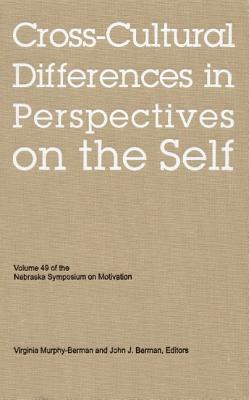Cross-Cultural Difference in Perspectives on the Self features the latest research in a dynamic area of inquiry and practice. Considered in these pages are cross-cultural differences in the idea of the person and in models of balancing obligations to the self, family, and community. Revisiting and questioning the concepts of self and self-worth, the authors investigate the extent to which factors traditionally associated with psychological effectiveness (intrinsic motivation; assuming personal responsibility for one's actions; and feeling in control, unique, hopeful, and optimistic) are culturally bound. Hazel Markus and Shinobu Kitayama consider cultural differences in models of psychological agency; Joan Miller critiques the meaning of the term agency, analyzing the extent to which many popular theories in psychology rest on rather narrow Western models of behavior and effective functioning; Steven Heine calls into question the presumed universality of some forms of cognitive processing; Sheena Iyengar and Sanford DeVoe apply a cross-cultural perspective to better understand intrinsic and extrinsic motivation and the value of choice; Kuo-shu Yang questions the universality of the pervasive and popular "theory of self-actualization" formulated by Abraham Maslow; and finally, Ype Poortinga reexamines not only the cultural boundaries of theory but also the very meaning of the concept of culture itself. Virginia Murphy-Berman is a visiting professor of psychology at Skidmore College. John J. Berman is a professor of psychology at Skidmore College and the editor of the Nebraska Symposium on Motivation, Volume 37: Cross-Cultural Perspectives (Nebraska 1990).
| FindBook |
有 1 項符合
Cross-cultural Differences in Perspectives on the Self的圖書 |
 |
Cross-cultural Differences in Perspectives on the Self 作者:Dienstbier、Richard A.(EDT)/Murphy-Berman、Virginia(EDT)/Berman、John J.(EDT 出版社:University of Nebraska Press 出版日期:2003-12-01 語言:英文 規格:精裝 / 341頁 / 23.9 x 15.7 x 3.3 cm / 普通級 / 初版 |
| 圖書館借閱 |
| 國家圖書館 | 全國圖書書目資訊網 | 國立公共資訊圖書館 | 電子書服務平台 | MetaCat 跨館整合查詢 |
| 臺北市立圖書館 | 新北市立圖書館 | 基隆市公共圖書館 | 桃園市立圖書館 | 新竹縣公共圖書館 |
| 苗栗縣立圖書館 | 臺中市立圖書館 | 彰化縣公共圖書館 | 南投縣文化局 | 雲林縣公共圖書館 |
| 嘉義縣圖書館 | 臺南市立圖書館 | 高雄市立圖書館 | 屏東縣公共圖書館 | 宜蘭縣公共圖書館 |
| 花蓮縣文化局 | 臺東縣文化處 |
|
|
圖書介紹 - 資料來源:博客來 評分:
圖書名稱:Cross-cultural Differences in Perspectives on the Self
|











